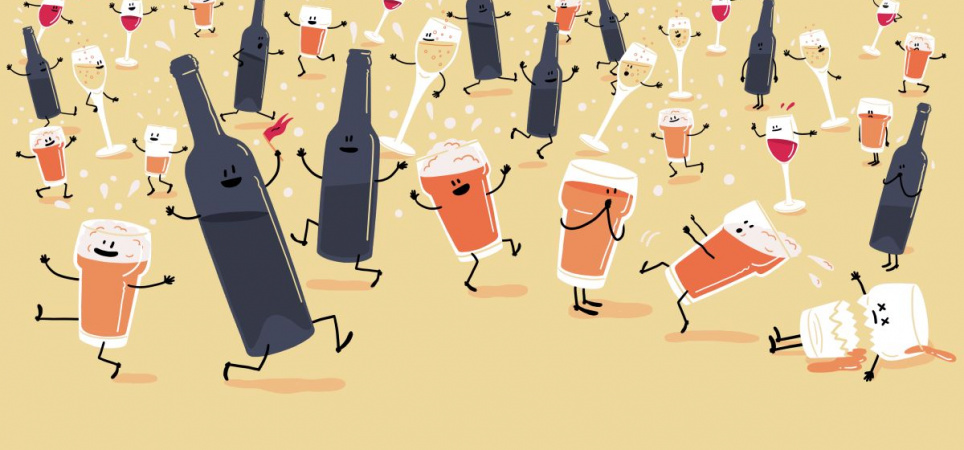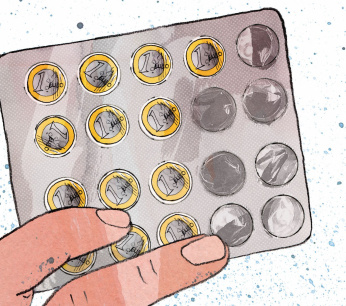Alcohol-free campus is still a long way off in higher education
Heavy drinking has a negative impact on mental health and academic performance. But curbing alcohol consumption is a sensitive issue in higher education. "Vegetarian snacks are more easily accepted than alcohol-free drinks."

Picture: Nanne Meulendijks
“Higher education is full of traditions to which alcohol belongs,” says addiction researcher Rob Bovens. “Graduation ceremonies, promotions, the opening of the academic year, there is always a drink afterwards. There really is an alcohol culture. When I started as a lecturer in addiction prevention at the Windesheim University of Applied Sciences, alcoholic drinks were for sale in the canteens and there was a pub next to the lecture hall in the main building. ”
Bovens is currently affiliated with Tilburg University and was involved in drawing up the National Prevention Agreement in 2018, in which it was agreed that problematic alcohol consumption among young adults must be reduced by half by 2040. He participated in a study by the Trimbos Institute into effective alcohol policy in higher education, which was published in May.
Cut down on
Universities and colleges play an important role in reducing alcohol problems, says Bovens. Students drink more than their peers, how much more should be shown by a national RIVM study that has been postponed for a year due to the corona crisis. “Drinking a lot is partly part of the life phase. After their studies most of them decrease, but some develop serious drinking problems. That is why it is important to break through the drinking culture in higher education. ”
Admitting you have a drinking problem is even more embarrassing than having a burnout
“Alcohol is a huge problem,” says Jolien Dopmeijer, teacher / researcher at Windesheim University of Applied Sciences. She is finalizing her PhD research into the relationship between psychological problems, alcohol and drug use and study success. “90 percent of the students are risk drinkers by standard standards. That's mainly because of it Binge-drinks in which five or six glasses are drunk within a short period of time. ” Risky drinking is not the same as problematic alcohol consumption, she puts it into perspective. “My research shows that 20 percent of the students are really a problem drinker. They run the risk of developing alcohol addiction. ”
Binge drinkers
The other binge drinkers suffer negative consequences. “Drinking a lot has a huge impact on the study. It causes concentration problems, absence and ultimately study delay and dropout, ”says Dopmeijer. In 2016, RIVM already calculated that 20 percent of the study delay in higher education is due to risky alcohol consumption, which costs at least 47 million euros per year.
Chill corners
The alcohol hazard has long been downplayed. “We drank a lot during our studies,” Bovens was often told when he raised the problem. Thanks to the NIX2014 policy introduced in 18, this is on the way. This year, due to the corona epidemic, no alcohol was allowed at all during the introductory festivals, but alcohol moderation and the provision of non-alcoholic drinks were already the trend since no more alcohol can be sold to young people under 18.
Twenty percent of the study delay comes from risky alcohol consumption
“We have agreed with party caterers that the tap won't open until four,” says Esther Tonnaer, student welfare consultant at Fontys Hogescholen. “Because there are also enough young people who do not like beer and hossen, there are now also chill corners where they can party in a more relaxed way,” adds her colleague Marjolein Janssen. She coordinates the Fontys Vital program, which should contribute to a healthy work and study climate.
Inaugurations
Last year, Utrecht University agreed that no more would be served before five hours. Which does not mean that you cannot drink at all during the day. An exception has been made for the Academy Building, where promotions, inaugurations, lectures and conferences are held, the supermarket on campus sells wine and beer and the commercially run grand café is tapped during the day. “The policy only applies to our own buildings,” explains student counselor Anne Hamburger. “Our approach is not to ban drinking, but to discourage drinking during working and teaching hours.”
Sensitive
“Alcohol policy is more than limiting the availability of drinks. It should be part of the welfare policy for students and employees, but that is still in its infancy, ”says addiction researcher Bovens.
Our approach is not to prohibit alcohol, but to discourage drinking during working and educational hours
Colleges and universities often strive for a healthy campus, but only focus on healthy nutrition, exercise and dealing with stress. The prevention of drinking problems is not on that list, while the highly educated drink more than the less educated and 9 to 10 percent of the population has alcohol problems. With underperformance and high absenteeism as a result.
Vegetarian snacks
But alcohol policy for staff is a sensitive issue. "At a graduation ceremony, vegetarian snacks are more easily accepted than an alcohol-free drink," says Jolien Dopmeijer. "Alcohol consumption is more difficult to discuss than dietary behavior," says Fontys Vitaal manager Marjolein Janssen. "Saying something about drinking has a higher threshold."
“While heavy drinking naturally has a major impact on mental health,” says consultant Tonnaer. "So we really have to do something with that." That is why developing an integrated alcohol policy is high on the priority list at Fontys.
Negotiable
Raising the topic of alcohol problems among students will be an important task for student coaches and teachers. According to Tonnaer, training courses already exist for early identification of mental problems. "We will also offer these for alcohol problems."
The big problem, according to Janssen, is how you address someone about this. “We already have a policy for identifying drinking problems among employees. Of course, a manager offers help and can refer you to a company doctor. But I don't know how often that happens in practice. ”
Saying something about drinking has a high threshold
It is not yet widely known that problematic drinking can adversely affect study and work. Awareness campaigns are needed for this. “But we will always frame that positively,” says Tonnaer. “We don't have a smoking ban, but a smoke-free campus and we certainly don't want a reclaimed campus. We take as a starting point what you get if you don't drink or drink less. ” A better night's sleep and a higher resistance, says Rob Bovens. "Not unimportant in corona time." But you should let people experience that for themselves, he thinks. This is very well possible in higher education in the form of research. "For example, what happens to my ability to concentrate if I don't drink for thirty days?"
Shame
Awareness campaigns, making it clear what the dangers of alcohol consumption are, that is what universities and colleges have to do. “But the biggest problem is how to get problem drinkers to seek help,” says Jolien Dopmeijer. “Students are not inclined to seek help if they are not feeling well. They are too ashamed of that in these times when the pressure to perform is great. You can already see that in fear and gloom, but this applies even more to drinking problems. Admitting that you have a drinking problem is even more embarrassing than having a burnout. ”
Dopmeijer has high expectations of online health tests in which students receive personal feedback on their drinking behavior. If there are risks, they are referred to an online tool that is tailored to their personality profile. “Research has shown that certain profiles are a good predictor for the development of alcohol problems. For example, anxious people have a greater risk of addiction. ”
Screening
In fact, all students should take such a test, says Dopmeijer. “At Windesheim, every student receives an invitation for our own screening and only 20 to 25 percent participate. Fortunately, this is a representative group so that I can show that such a test has a preventive effect. Binge drinking really decreases with students who took the test ”
Windesheim does not reach all students with the tests. That is why Dopmeijer advocates that mental health should be part of the curriculum of all study programs. “This is already the case at Codarts Art University. All students take a test and during the lessons they discuss how to stay healthy. Then taking care of your psychological and physical health becomes part of your professional development. So I plead for offering mental health skills in education and you can start with that in primary school. ”


